A NSFW LONG-FORM PODCAST ABOUT
THE COLD WAR
The US vs the USSR.
From 1945 until 1991, the world’s two superpowers played a dangerous game of nuclear brinkmanship that very nearly brought human civilisation to an end. How did it start? Why did it start? How did it end? Did it end? These are the questions we are exploring in detail.
First time here?
Latest Post
Your Humble Hosts
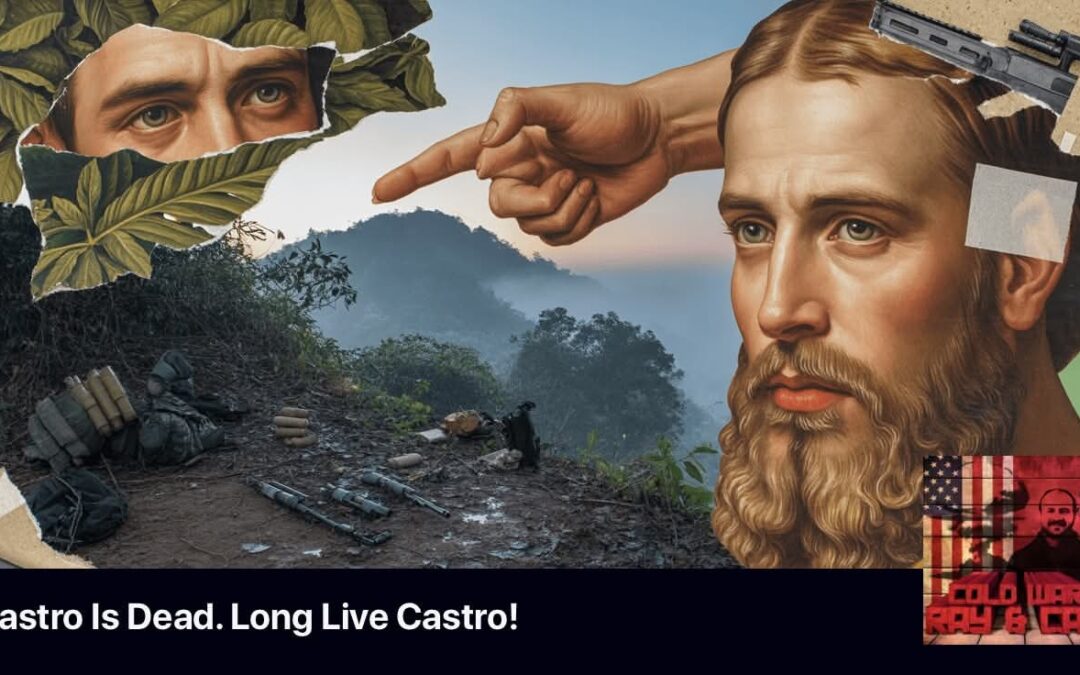
Cold War #299 – Castro Is Dead. Long Live Castro! (Cuban Revolution #24)
In this episode, Cameron and Ray pick up the Cuban Revolution story at its most fragile moment: Fidel Castro has just landed in eastern Cuba with 82 men, most of them dead, scattered, or captured within days. Batista’s regime confidently declares Castro dead, the international press runs with it, and the revolution appears finished before it has begun. But history, as usual, has other plans. From hiding under sugarcane leaves to scraping together a band of 19 survivors in the Sierra Maestra, Castro learns guerrilla warfare the hard way. The episode traces his first small victories, the brutal countermeasures of the Batista regime, and the human cost borne by peasants caught in between. The story then pivots to one of the most consequential acts of propaganda in Cold War history: Castro’s calculated courtship of the international press. Through Herbert Matthews’ risky journey into the mountains and his front-page New York Times reporting, the world learns that Fidel Castro is very much alive, organised, and growing. This episode explores how myth, media, theatre, and violence intertwine at the birth of a revolution—and how a handful of men with rifles, cigars, and a journalist changed global perceptions overnight.
Latest Episode

Cold War #299 – Castro Is Dead. Long Live Castro! (Cuban Revolution #24)
In this episode, Cameron and Ray pick up the Cuban Revolution story at its most fragile moment: Fidel Castro has just landed in eastern Cuba with 82 men, most of them dead, scattered, or captured within days. Batista’s regime confidently declares Castro dead, the international press runs with it, and the revolution appears finished before it has begun. But history, as usual, has other plans. From hiding under sugarcane leaves to scraping together a band of 19 survivors in the Sierra Maestra, Castro learns guerrilla warfare the hard way. The episode traces his first small victories, the brutal countermeasures of the Batista regime, and the human cost borne by peasants caught in between. The story then pivots to one of the most consequential acts of propaganda in Cold War history: Castro’s calculated courtship of the international press. Through Herbert Matthews’ risky journey into the mountains and his front-page New York Times reporting, the world learns that Fidel Castro is very much alive, organised, and growing. This episode explores how myth, media, theatre, and violence intertwine at the birth of a revolution—and how a handful of men with rifles, cigars, and a journalist changed global perceptions overnight.
Recent Episodes
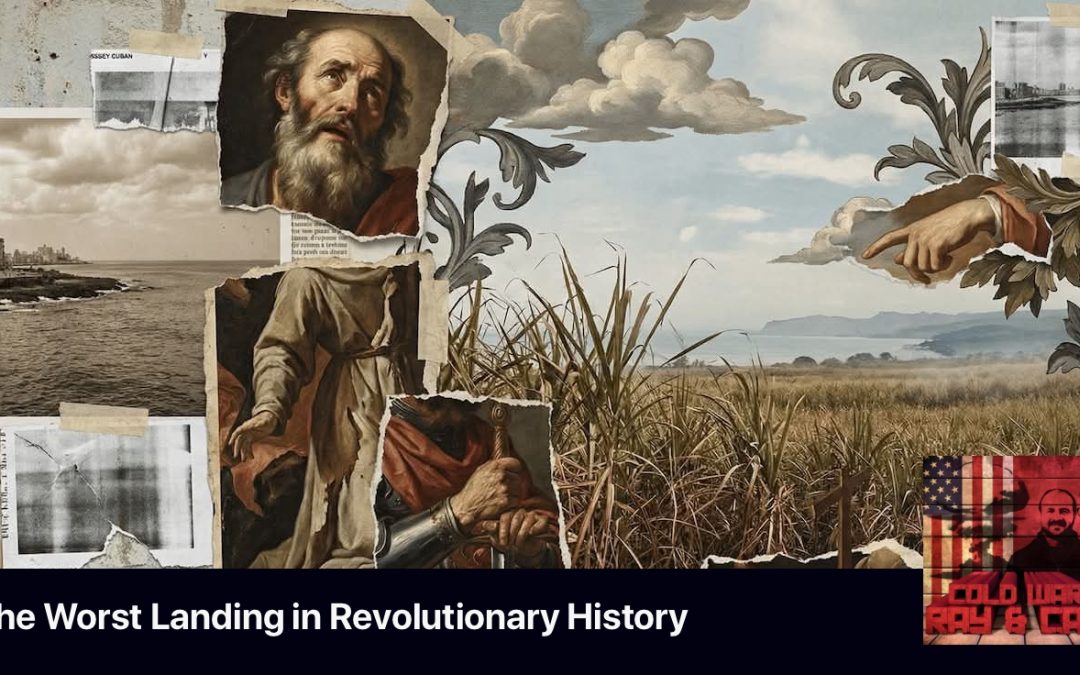
Cold War #298 – The Worst Landing in Revolutionary History (Cuban Revolution #23)
Episode 298 follows Fidel Castro’s disastrous return to Cuba aboard the *Granma* and the near-total collapse of his carefully laid plans within days of landing. What was meant to be a coordinated uprising turns into a brutal fight for survival as delays at sea, bad weather, poor logistics, and immediate detection by Batista’s forces leave Castro’s men sick, starving, scattered, and under constant aerial and ground attack. Drawing heavily on Castro’s later reflections and Che Guevara’s diaries, the episode explores leadership under failure, revolutionary psychology, and the razor-thin line between annihilation and persistence. With only a handful of surviving fighters and a few rifles, Castro reframes catastrophe into resolve, convinced that even seven guns are enough to win a revolution.
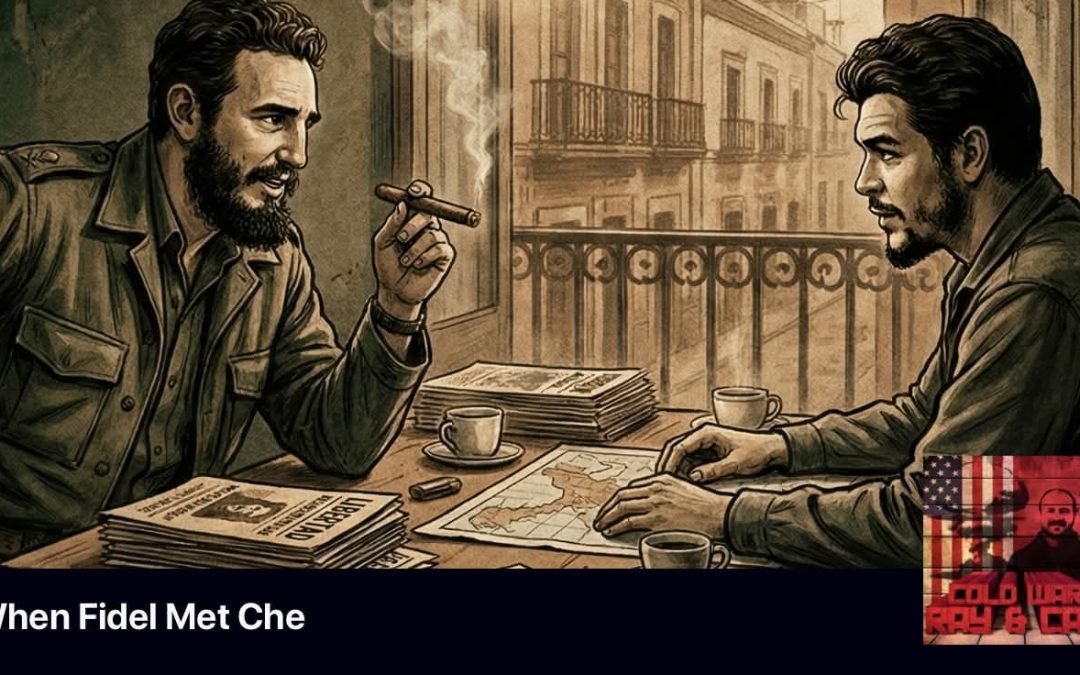
Cold War #296 (fixed) – When Fidel Met Che (Cuban Revolution #21)
In this episode, Fidel Castro steps out of prison in 1955 and straight into revolutionary planning. We trace his transformation from imprisoned dissident to a man preparing an armed insurrection in exile. We explore his belief in luck, conviction and humility, his frustrating attempt to re-enter Cuban politics, his move to Mexico, and his first electrifying meeting with Ernesto “Che” Guevara. Cameron and Ray dig into why Castro’s charisma made him dangerous to Batista, how Che’s time in Guatemala radicalised him, and how American corporate interests helped crush democracy in Latin America. Along the way we hear about cigars, motorcycle diaries, CIA “successes” that produced decades of bloodshed, Cuban rum, and why delusional certainty sometimes wins revolutions.
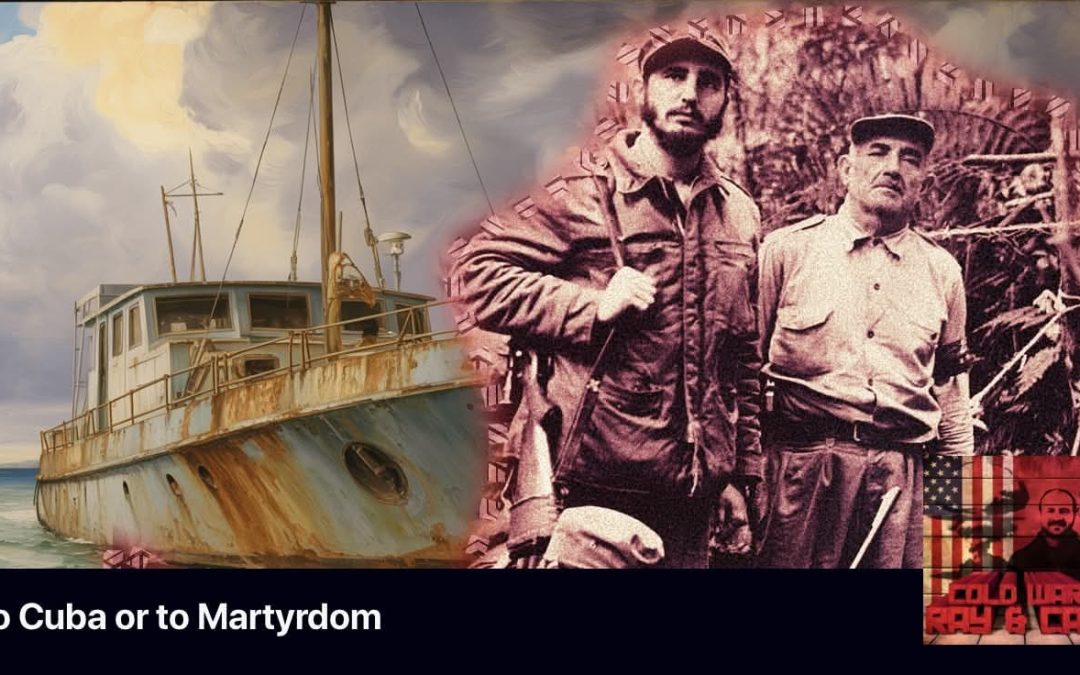
Cold War #297 – To Cuba or to Martyrdom (Cuban Revolution #22)
In this episode of *The Cold War*, Cameron and Ray trace the strange, lucky, unlikely, often chaotic road that led Fidel Castro, Che Guevara, and their small band of exiles from a rented farm outside Mexico City to the deck of the *Granma* in late 1956. The show follows their botched guerrilla training, their arrest by Mexican police, Che’s absolute refusal to hide his communism, the ideological debates that erupted right inside the interrogation room, and the role of former presidents of Mexico and Cuba in getting them released. Fidel’s memoirs come alive in long excerpts about Stalin, Trotsky, Che’s stubborn fearlessness, and the enormous role of luck in history. The episode finishes with Che’s own recollection of meeting Fidel, forging their bond, and boarding the *Granma* with the now-famous vow: *“In 1956, we will be free or we will be martyrs.”*
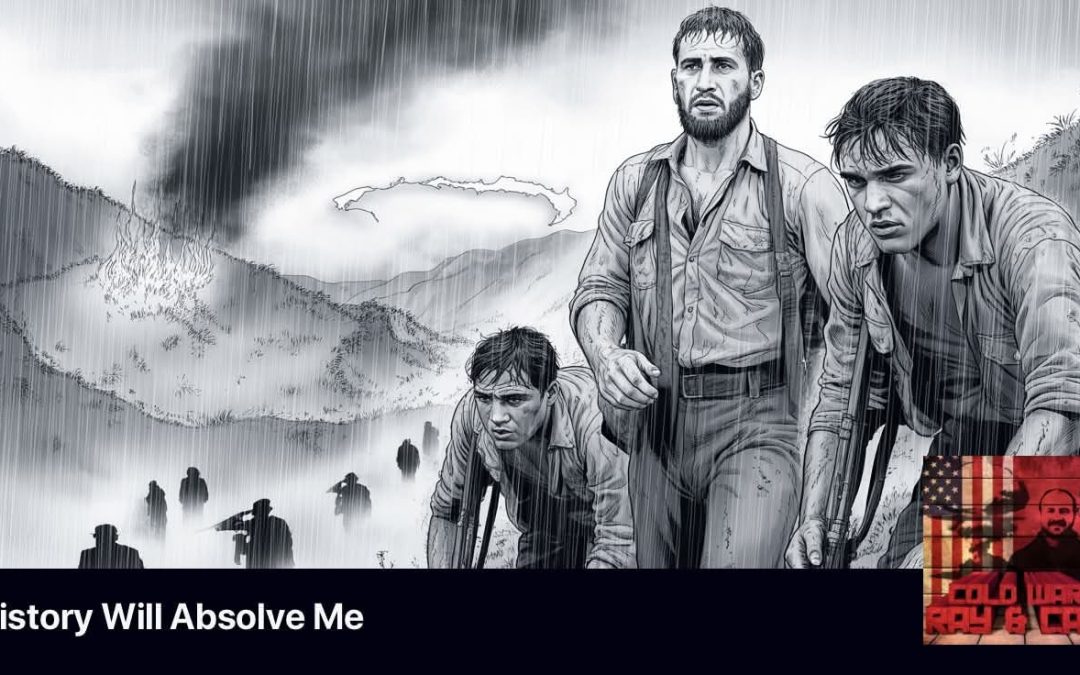
Cold War #295 – History Will Absolve Me (Cuban Revolution #20)
Fidel Castro’s first attempt to ignite revolution in Cuba ends in disaster — but also forges the legend. We follow the aftermath of the failed 1953 Moncada Barracks raid: the brutal reprisals, Fidel’s near-execution, the unlikely lieutenant who saves him, the public opinion shift as Batista’s regime overreaches, and Fidel’s transformation from fiery idealist to imprisoned revolutionary intellectual. We hear how History Will Absolve Me is born, what Fidel is reading behind bars (spoiler: Trotsky and Roosevelt), and how his personal life gets… complicated. By the time he’s released after only two years, Castro is no longer just a nuisance — he’s become the most famous man in Cuba and an unstoppable symbol of rebellion. 
Welcome To The Cold War Podcast!
1. There are TWO OF US. This is a conversation, not a lecture.
2. It’s LONG FORM. Which means we will take hundreds of episodes to tell a story. If you want a quick overview, this is not the show for you!
3. It’s NSFW. While we take the history very seriously, we also know that learning is more effective when you’re having fun. Sometimes (okay, quite often) “having fun” for us translates as bad language and dirty jokes. Let’s face it – this history is violent and sexy. This is NOT a child-friendly show, nor is it safe for work.
4. We CHARGE MONEY for the latest episodes. We do this for a living and put a lot of time and effort into making our content. So you can listen to the first couple of years worth of episodes for free, but the more recent episodes (produced this year) require a paid subscription. Feel free to listen to the free ones and then, if you like them, register to listen to the rest.
Learn more about the show and hosts.
TASTE TESTER
Listen to some free episodes below.
CAM & RAY’s COLD WAR PODCAST
Listen Now!
The first couple of hundred episodes of the show are available for free. That’s a taste-tester of a couple of hundred hours. If you listen to those and decide you want to hear more, than please register to listen to all of the premium episodes.
You can check out our free episodes on Apple and Google devices by clicking the links below
(or searching for them in the app of your choice).
Or go here to listen in your browser.
You can also find one of our miniseries (where we focus on a particular topic for multiple episodes).
Awesome
★★★★★ in Apple Podcasts by Kingstonnnnnn from the United Kingdom on September 15, 2022
I clicked on this podcast out of curiosity. I was interested in learning about Israel and fell into a giant hole. I previously listened to The Caesar, Alexander and renaissance podcasts, so, I was familiar with Ray and Cam’s format. However, how these two can make history so fun and exciting Is an art form, I was not even remotely interested in the Cold War but thanks to these two, I will now need to find books about Oppenheimer, Stalin, the atomic bomb and operation Alsos. You guys make me curious and make me question the way I view things. Keep up the good work.
View and share this review
History, mockery and occasional drinking
★★★★★ in Apple Podcasts by kristinsg from Norway on September 30, 2019
These folks actually make history podcasts worth listening to. A great mixture of good historical analysis and phrases like “took a dump on the whole agreement” or having “testicular fortitude”. Love it. And love the fact that they are looking at things from several sides, not the usual “the Soviets were evil and hated freedom, but America won the war and saved the day”.
Amazing
★★★★★ in Apple Podcasts by Renato.uwu from United States of America on October 5, 2019
This is my favorite History podcast. I love the dynamic and structure of the episodes. My favorite episodes so far have been the mini Fidel Castro bio and the Philippines one. They were both incredible and I also really liked the episodes on the Cambridge 5. The whole show has been very eye opening and I really appreciate the comedy as well as the work Cam puts into the show and the ocasional looks into the future provided by Ray. My one small critique is that I think they’ve taken to long to outline WWII (which is not my favorite thing to study) but I’ve managed to stick with it and am very happy I did because I’ve learned a lot that was never mentioned in school. Even so I can’t wait till I get to the end of WWII hopefully by the end of the week. Thank you very much Cam and Ray for being my teachers and for the free student subscription it means a lot 🙂 <3 !







